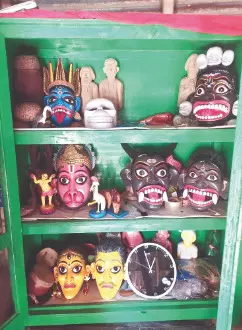
BALURGHAT, April 1 -- As the Gazon festival approaches, the demand for traditional wooden masks in South Dinajpur has surged, bringing renewed vigour to the region's artisans. These handcrafted masks, deeply embedded in local folk culture, are an essential part of the Gazon celebrations, which honour Lord Shiva.
Villages such as Mahisbathan, Patiram and Tapan are known for their skilled craftsmen who meticulously carve and paint these masks. Made primarily from lightweight wood such as gamhar and neem, the masks showcase vibrant colours and expressive designs, depicting deities, mythological characters and folk legends.
One such artisan, Gopal Das from Mahisbathan, shared his experience: "We begin our work months in advance. Each mask requires days of detailed carving and painting. This year, orders have doubled as more performers and devotees seek these unique pieces."
The Gazon festival, widely observed by the local Hindu community, involves devotional songs, fasting and dramatic folk performances known as Gazon Jatra. These wooden masks play a crucial role in these performances, allowing dancers and actors to personify divine and mythological beings. Another dedicated artisan, Ganesh Barman from Balapur in Tapan block, has been crafting wooden masks for over 25 years. Specialising in Kali masks and other deity representations, Barman sells his creations for approximately Rs 5,000 to Rs 6,000 each. Despite the high demand, he struggles to sustain his craft due to financial constraints and lack of government support.
"The state government provides financial aid to various artisans but I have yet to receive any benefits despite applying," Barman lamented. "I rely on this craft to support my family and with the arrival of Gazon, demand for these masks peaks. My creations sell well across South Dinajpur, especially during this festival." Despite their cultural significance, wooden mask artisans face challenges such as rising material costs and declining financial prospects, prompting many young craftsmen to abandon the trade.
Local cultural organisations have urged authorities to recognise wooden mask-making as a heritage craft and extend necessary aid. As the Gazon festival nears, the rhythmic sounds of chisels and hammers resonate through the villages of South Dinajpur, while freshly painted masks bring life and colour to a tradition that continues to persevere against all odds.
Published by HT Digital Content Services with permission from Millennium Post.
